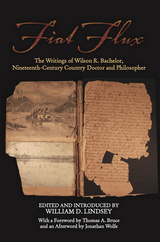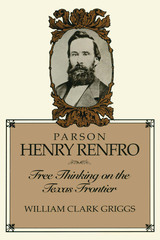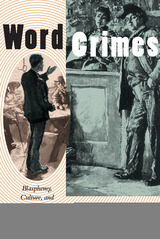4 books about Freethinkers

Fiat Flux
The Writings of Wilson R. Bachelor, Nineteenth-Century Country Doctor and Philosopher
William D. Lindsey
University of Arkansas Press, 2013
Wilson R. Bachelor was a Tennessee native who moved with his family to Franklin County, Arkansas, in 1870. A country doctor and natural philosopher, Bachelor was impelled to chronicle his life from 1870 to 1902, documenting the family's move to Arkansas, their settling a farm in Franklin County, and Bachelor's medical practice. Bachelor was an avid reader with wide-ranging interests in literature, science, nature, politics, and religion, and he became a self-professed freethinker in the 1870s. He was driven by a concept he called "fiat flux," an awareness of the "rapid flight of time" that motivated him to treat the people around him and the world itself as precious and fleeting. He wrote occasional pieces for a local newspaper, bringing his unusually enlightened perspectives to the subjects of women's rights, capital punishment, the role of religion in politics, and the domination of the American political system by economic elite in the 1890s. These essays, along with family letters and the original diary entries, are included here for an uncommon glimpse into the life of a country doctor in nineteenth-century Arkansas.
[more]

Freethinkers, Libertines and Schwarmer
Heterodoxy in German Literature, 1750-1800
K. F. Hilliard
University of London Press, 2010
Professor Senia Pašeta argues that our understanding of modern Irish and British politics would be enormously enriched if we recognized two things: that the Irish and British suffrage movements were deeply connected; and that the women’s suffrage movement across the United Kingdom was shaped in fundamental ways by the Irish Question from the late nineteenth century and into the twentieth. In other words, the women’s suffrage movement did not exist in a political vacuum. It interacted with, influenced and was influenced by the other main political questions of the day, and with the main political question of the day - Ireland.
[more]

Parson Henry Renfro
Free Thinking on the Texas Frontier
By William C. Griggs
University of Texas Press, 1994
The years following the Texas Revolution held even more turbulent events as diverse droves of pioneers crossed the Sabine and Red Rivers to start new lives in Texas. Early Texas society contended with religious issues, family life in a rugged environment, and the Civil War. This cultural history was clearly reflected in the life of frontier preacher Henry C. Renfro. Migrating to Texas in 1851, Renfro enrolled in the fledgling Baylor University and became a Baptist preacher. Eventually disillusioned with Baptist orthodoxy, Renfro was disenfranchised on charges of infidelity as he embraced the ideals of the Free Thought Movement, inspired by the writings of men such as Thomas Paine, Spinoza, and Robert Ingersoll. Renfro's Civil War experience was no less unusual. Serving as both soldier and chaplain, Renfro left a valuable legacy of insight into the conflict, captured in a wealth of correspondence that is in itself significant. Drawing on a vast body of letters, speeches, sermons, and oral histories that had never before been available, this chronological narrative of "The Parson's" life describes significant changes in Texas from 1850 to 1900, especially the volatile formation and growth of Baptist churches in North Central Texas. William Griggs' study yields numerous new details about the Free Thought Movement and depicts public reaction to sectarian leaders in nineteenth-century Texas. The author also describes the developing Central Texas region known as the Cross Timbers, including the personal dynamics between a frontier family and its patriarch and encompassing such issues as property conflicts, divorce, and family reconciliation. This work unlocks an enlightening, engaging scene from Texas history.
[more]

Word Crimes
Blasphemy, Culture, and Literature in Nineteenth-Century England
Joss Marsh
University of Chicago Press, 1998
In 1883 the editor of a penny newspaper stood trial three times for the "obsolete" crime of blasphemy. The editor was G. W. Foote, the paper was the Freethinker, and the trial was the defining event of the decade. Foote's "martyrdom" completed blasphemy's nineteenth-century transformation from a religious offense to a class and cultural crime.
From extensive archival and literary research, Joss Marsh reconstructs a unified and particular account of blasphemy in Victorian England. Rewriting English history from the bottom up, she tells the forgotten stories of more than two hundred working-class "blasphemers," like Foote, whose stubborn refusal to silence their "hooligan" voices helped secure our rights to speak and write freely today. The new standards of criminality used to judge their "word crimes" rewrote the terms of literary judgment, demoting the Bible to literary masterpiece and raising Literature as the primary standard of Victorian cultural value.
From extensive archival and literary research, Joss Marsh reconstructs a unified and particular account of blasphemy in Victorian England. Rewriting English history from the bottom up, she tells the forgotten stories of more than two hundred working-class "blasphemers," like Foote, whose stubborn refusal to silence their "hooligan" voices helped secure our rights to speak and write freely today. The new standards of criminality used to judge their "word crimes" rewrote the terms of literary judgment, demoting the Bible to literary masterpiece and raising Literature as the primary standard of Victorian cultural value.
[more]
READERS
Browse our collection.
PUBLISHERS
See BiblioVault's publisher services.
STUDENT SERVICES
Files for college accessibility offices.
UChicago Accessibility Resources
home | accessibility | search | about | contact us
BiblioVault ® 2001 - 2024
The University of Chicago Press









